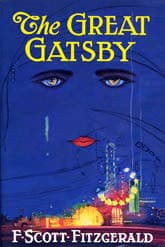The Great Gatsby
Critique • Quotes
 First edition
First editionFirst publication
1925
Literary form
Novel
Genre
Literary
Writing language
English
Author's country
United States
Length
Approx. 48,500 words
Gatsby keeps getting greater
Unbelievably, few people read The Great Gatsby when it was first published. In the roaring Twenties, its questioning of the American Dream may not have been welcome. Other American writers, like Sinclair Lewis and Ernest Hemingway, were successful with critical or jaded looks at the lives of the post-Great War generation, but Fitzgerald's novel must have seemed a particular betrayal.
Scott Fitzgerald had been the chronicler of the jazz age, of the antics of the fun-loving, high-living, affluent, young adults of that era. It was overlooked that his chronicling had always been from an ambivalent position as he seemed to simultaneously enjoy and expose his subjects in his stories and novels.
But in The Great Gatsby, the flappers and faux philosophers of the age are brushed aside as trivial decoration, as Fitzgerald uncovers a flaw in the spirit of not just a generation but a civilization bred to worship acquisition.
By the Great Depression of the 1930s, when such a message might expect to be better received, Fitzgerald was starting to seem a relic of a previous era. Social critiques set in those hard times, as in the work of John Steinbeck, were perceived to be much more relevant than a fable of the very rich set in a time of seeming plenty.
But, for once, the critics and academics were ahead of the populace. Their admiration for The Great Gatsby kept it alive long after Fitzgerald's death. The baby-boomer generation of the 1950s to 1970s was taught The Great Gatsby as part of the canon of modern literature. The book's themes certainly seemed relevant to a new post-war (WWII) and during-war (Vietnam) generation which was questioning some of the same values as Fitzgerald.
Since then, The Great Gatsby has risen still higher as both the literati and the general public have been able to provide the assessment that comes only with the passage of time. It has become one of the most popular and greatly admired novels of the twentieth century.
Deeply affecting
First there's the magnificent writing. So many lines seize upon unexpected detail to inspire vivid imagery in a kind of poetic prose (a phrase I usually despise as a warning that what follows is incomprehensible, but here is admiring). Describing the partying lifestyle at Gatsby's mansion:
In his blue gardens men and girls came and went like moths among the whisperings and the champagne and the stars.
Every Friday five crates of oranges and lemons arrived from a fruiterer in New York—every Monday these same oranges and lemons left his back door in a pyramid of pulpless halves.
Fitzgerald has been criticized in Gatsby for occasionally slipping into vague, abstract language. But, every time, it is justified as reflecting the psychology of the character whose perceptions the reader is temporarily sharing. Except for that deeply affecting, much-quoted ending in which we all share.
And there are the odd little situations that Fitzgerald has a knack for inventing and presenting without them seeming invented: Jay Gatsby, for example, showing off his nouveau wealth by heaping his dozens and dozens of fine shirts on a bed and Daisy Buchanan breaking down, crying over them "because I've never seen such—such beautiful shirts before." It's one of his patented scenes, telling you more about these two characters than another writer's paragraphs of description could.
And there is the controlled point of view, which is unusual for Fitzgerald. We see the characters, the setting, the whole story through the eyes of Nick Carraway. A Midwesterner from an affluent but not fabulously wealthy background, the narrator provides just the right measure of objectivity and sympathy to give us insight into the world of Gatsby and the Buchanans without losing our wider perspective.
And there is the brilliant plot. This is a story that reads with the inevitability of an allegory, yet still surprises. It has a freshness that bears repeated reading, making The Great Gatsby one of the novels that one should try to read at least every ten years. You'll find more to it at each stage of your own life.
I'm just glad Fitzgerald didn't stick with one title he was considering for this truly great novel: Gold-hatted Gatsby. The adjective Great is much more appropriate on various levels.
— Eric
Critique • Quotes

